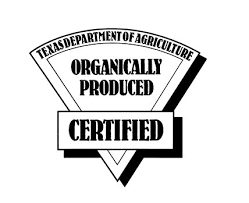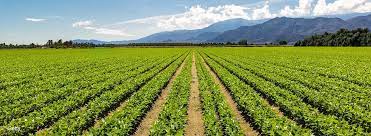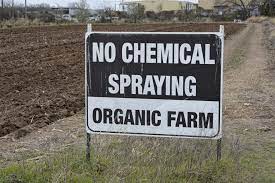
Organic Blog 5 Keith Jones
This is the fifth blog on the subject of Texas creating the first organic label. Please read the first 4 which explains the background of organics in Texas.
Once the process of organic certification had been set up, someone needed to enforce it. In Texas, that someone was Keith Jones.
“I was looking to get back into agriculture. I had been a part of the mid ‘80s farm crisis; had moved to Dallas and had gone to work for a bank in Dallas and was really needing to get back into agriculture some way.”
“I tried to get back into production agriculture through greenhouse operations and things like that. Long story short, that didn’t work out. In the process of me looking for the next steps, I stumbled across a number of organic gardening magazines that my grandmother had.”
I called Bill Francis(chair of Hightower’s Organic Standards task force); told him who I was and what I was doing. He said, ‘You’ve got a background. You ought to talk to Dan Kelly. And you need to really take serious what Hightower is trying to do, because I think it’s going to be a good thing.’ That probably was in the early part of 1988, January or February of ’88”
Keith Jones was the person on the ground responsible for certifying the farms, making sure they were farming according to the regulations. You didn’t get your label unless Keith Jones said it was okay. For a short period of time, he was the only government employee, whether federal or state, in the United States that was certifying farms as organic. But eventually, National Organic Standards were set when Congress passed the Organic Foods Production Act of 1990 (OFPA). In the hearings in Washington, Congress paid close attention to the Texas standards and accepted most, but not all, of the regulations.
Keith Jones was one of the Texas TDA personnel who testified in Washington.
“We had a three-year pesticide withdrawal period that got adopted. The verification method that we had at TDA tracked the entire food chain. Producers, processors, distributors, retailers – that got adopted as well. The buildout of the program was a long time coming. One of the things that didn’t get adopted that we had in the Texas program was a transitional program. And we even had a transitional label that basically said, “If you were one year without pesticides, you could use the transitional label as a way to kind of recognize in the marketplace your movement towards being fully certified. That didn’t get adopted at the national level.”
The national standards were a floor. States could adopt stricter standards. I don’t think any did. Primarily because they didn’t want to confuse customers. What they moved to was different designations—such as sustainable food or humane food.
Keith Jones is proud of the ultimate impact.
“The legacy is that organic agriculture is a $50 billion segment. I mean $50 billion at the retail level. When consumers are looking for a level of assurance, organic is what they consider. Organic has become the default consumer-facing standard for food products. I think that’s its legacy. It has not only endured. It’s become the default standard for consumers.
There are some problems however. Farmers call themselves sustainable and don’t bother with the organic label because of the cost.
The issue there is, I think, for smaller scale growers, particularly growers that sell into farmers markets, is that is a relationship-based transaction. Over time some of those growers have found that the paperwork and the record keeping necessary to be certified is an allocation of scarce resources. And if I don’t have to be certified, and I’ve got limited resources, then maybe it’s not the wisest thing from a financial standpoint, to go through the hoops just to say I’m organic. We see that as an outflow as the process of certification. I think you’re going to have some growers in the specialized market who simply say it’s probably not worth it.”
Keith Jones spent a fair amount of time proselytizing for organic standards.
“I conducted meetings all around the country, as well as the state. I presented the organic industry as a logical kind of step by step. Here’s what’s going on in the consumer world, working back from the consumer. Here’s what’s going on in your world in terms of increased costs, herbicide costs and that kind of thing. Here’s the marginal difference that you can increase your profitability. And so if you want to go into this space, we’re not guaranteeing you a profit but we’re giving you an opportunity to at least be as profitable as you possibly can. There’s increased costs in growing, things like that. In all the presentations that I made, I basically appealed self-interest. “I don’t know where this is going to go, but right now it looks like with Alar and everything, it looks like it’s going to be a sustainable market. It was a way that resonated with growers without getting into some of the controversial questions over pesticide use and the appropriateness of pesticide use.
I went back and looked at some of the promotional material we put together. We never harped on pesticide use, even though that was the precursor that we were using to grow the market. We basically said, “If you were concerned about pesticide use, here’s an alternative”. And that was also the way that I couched it to growers. “If you’re concerned about profitability and you’ve got some concerns about the chemistry you’re using, here’s an alternative. I’m not telling you what to do. Think about it.” It seemed to work. I can remember lots of meetings that I had from, the High Plains to East Texas to South Texas, you would get a lot of head nodding. I found it interesting that what was going on on the ground was different than the public messaging coming out of the Texas Farm Bureau. And in many cases, these were their voting members who were nodding their heads.
The whole point was to help the small farmer because the market wasn’t working right. Agribusiness was driving small farmers off the land, and the agribusiness was not supporting the soil.
We were always being kind of pigeonholed as all these lefties. Right in the Green Book, one of the chapter headings is “A sustainable economy is a market driven economy”. So we appealed to the markets and how markets are really supposed to work.
(Rick) Perry came in, they really believed that organic was just a fraud. It was just bogus, it was just another thing that Hightower had cooked up. The old conference rooms, they were off of Hightower’s office. I got pulled in there one afternoon. It was essentially a grilling with the sole purpose of trying to destroy the program. They would come in and say, “You’re attesting to the fact that herbicides or pesticides haven’t been used. How do you know?” I said, “Well if you’re using soil incorporated herbicides, you’re going to have root pruning. So if you’ve got weeds out there that the feeder roots are pruned off of, you’ve got a pretty good indication that herbicide has been used. If you’ve got weeds out there that’s got the taproot, the fruitful root ball and everything, you’ve got a pretty good indication that no herbicides have been used. It began to unfold just exactly what we do on the program and the extensiveness of the record keeping. And by five o’clock that afternoon, and I think this started like 10 o’clock that morning, they just hung their heads. I think they realized they’d been beat because we had it all figured out.”
Keith Jones went on to work in the organic foods industry at a national level. Jones first coordinated agriculture policy for Texas Gov. Ann Richards, where he promoted sustainable farming systems in Texas. He also headed a nonprofit organization that used horticulture to teach life skills to high-risk youth in East Austin. In 1998, the U.S. Department of Agriculture, long criticized for giving short shrift to organic foods, hired Keith Jones to lead the agency’s national organic program. From 2007 to 2021, he was a staff member of the U.S. House Agriculture Committee.
The alumni of the Hightower TDA have been influencing policy for quite some time. An impressive legacy, indeed.

